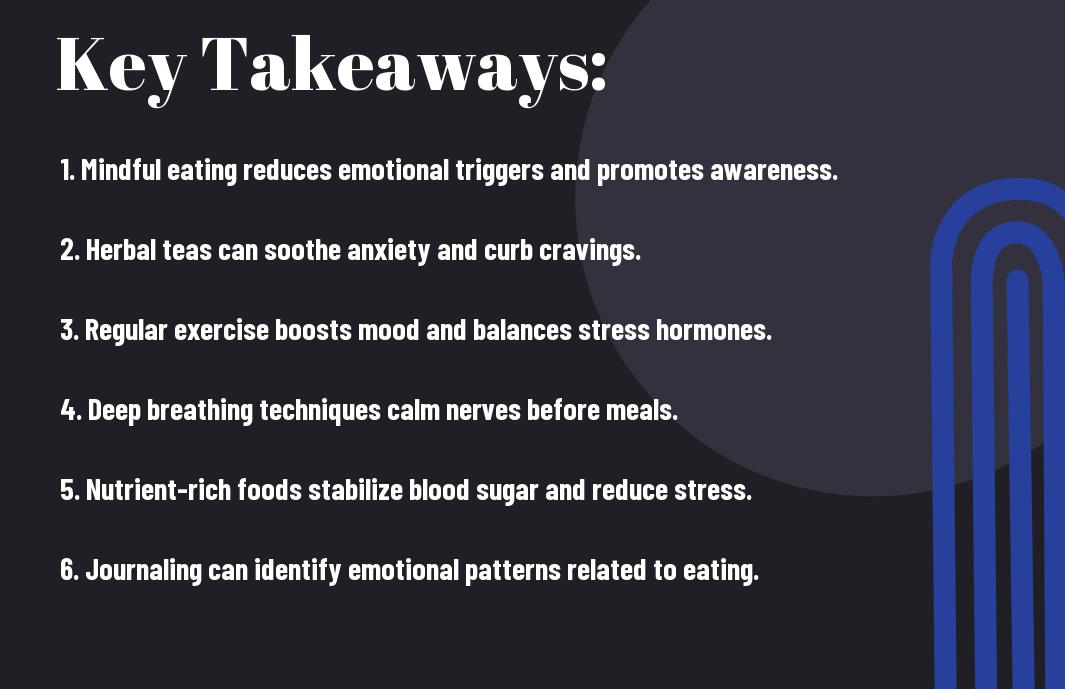With anxiety often influencing your eating habits, finding effective and natural solutions can help restore balance and promote healthier choices. This post will explore various strategies that you can incorporate into your daily routine, addressing the connection between anxiety and food behaviors. From recognizing emotional triggers to embracing mindfulness techniques, you’ll discover practical tips designed to empower you in managing anxiety-related eating, allowing you to nurture both your mind and body holistically.
Key Takeaways:
- Mindful Eating: Practice paying attention to food choices, textures, and flavors to build a healthier relationship with eating.
- Herbal Remedies: Explore natural herbs like chamomile and ashwagandha that can help reduce anxiety levels and curb emotional eating.
- Regular Exercise: Incorporate physical activity into your routine, as it boosts mood and can decrease anxiety-related cravings.
- Balanced Diet: Focus on a nutrition plan rich in whole foods, such as fruits, vegetables, and lean proteins, to support mental health.
- Breathing Techniques: Utilize deep breathing exercises to manage stress and anxiety before meals, aiding in reduced overeating.
- Sufficient Sleep: Prioritize restful sleep, as lack of sleep can exacerbate anxiety and lead to unhealthy eating patterns.
- Support Systems: Seek social support from friends, family, or professionals to help cope with anxiety-related eating habits.

Understanding Anxiety-Related Eating
While it is common to cope with anxiety through various means, many individuals find themselves turning to food as a source of comfort. This behavior, known as anxiety-related eating, often involves consuming food to alleviate feelings of stress or unease. Recognizing this pattern is the first step towards healthier coping strategies that do not involve food.
Definition and Symptoms
To define anxiety-related eating, it is characterized by consuming food in response to heightened feelings of anxiety and emotional distress. Symptoms may include eating when not physically hungry, cravings for specific comfort foods, and a sense of guilt or shame following overindulgence. Addressing these patterns is vital for fostering a healthier relationship with food.
Causes and Triggers
Eating due to anxiety can be influenced by various factors, including stress, emotional upheaval, and environmental triggers. You might find that certain situations or feelings prompt you to seek solace in food, creating a cycle that is hard to break. Factors such as boredom, loneliness, or even social pressures can further intensify the urge to eat as a way of coping with discomfort.
Considering the complexities of anxiety-related eating, it is important to identify your specific triggers. These triggers might involve stressful events, relationship issues, or even routine habits that predispose you to turn to food for comfort. By acknowledging these patterns, you can begin to explore healthier alternatives and develop a deeper understanding of your emotional landscape, paving the way for positive change.

The Connection Between Anxiety and Diet
Some studies suggest a significant link between anxiety and dietary choices. Your diet not only influences your physical health but also impacts your mental well-being. Poor nutrition can contribute to anxiety symptoms, while a balanced diet may help in alleviating such symptoms. Understanding this connection can empower you to make better food choices that support your mental health.
How Anxiety Influences Eating Habits
Before exploring dietary solutions, it is important to recognize how anxiety can shape your eating behaviors. Stress and anxiety often trigger emotional eating, leading you to seek comfort in unhealthy, calorie-dense foods. You may find yourself skipping meals or overeating as a way to cope, which can further exacerbate feelings of anxiety.
The Role of Nutrition in Managing Anxiety
At the same time, nutrition plays a pivotal role in managing anxiety. The nutrients you consume can affect neurotransmitter function, hormonal balance, and overall brain health. Incorporating foods rich in vitamins, minerals, and healthy fats can support your mood and promote stability in your emotional responses.
Consequently, focusing on a nutritious diet can be a powerful tool in alleviating anxiety. Foods high in omega-3 fatty acids, like fish and flaxseeds, alongside whole grains, fruits, and vegetables, can boost serotonin production and help you feel more balanced. By making informed dietary choices, you can effectively reduce anxiety symptoms and improve your overall mental well-being.

Natural Solutions for Reducing Anxiety
All individuals experience anxiety at various points in their lives, but finding natural methods to manage it can make a significant difference. Incorporating relaxation techniques, physical activity, and dietary adjustments into your routine may alleviate some symptoms. If you’re struggling, don’t hesitate to Get Help. Exploring healthy solutions can lead to more mindful eating habits and a positive relationship with food.
Herbal Remedies
Natural solutions such as herbal remedies can offer support in reducing anxiety. Herbs like chamomile, lavender, and ashwagandha have been known to promote relaxation and decrease stress levels. Incorporating these herbal supplements or teas into your daily routine may provide significant relief and improve your overall well-being.
Mindfulness and Meditation
About practicing mindfulness and meditation can profoundly impact your anxiety levels. These techniques encourage you to focus on the present moment, helping to calm your mind and reduce racing thoughts. By integrating simple breathing exercises and mindful awareness into your day, you can create a sense of peace and improve your relationship with food.
Solutions for anxiety through mindfulness and meditation involve consistent practice and patience. Set aside a few quiet moments each day to engage in deep breathing or guided meditation. Over time, these practices can lead to a more grounded mindset, making it easier to manage emotional triggers related to eating.

Nutritional Strategies to Combat Anxiety-Related Eating
Unlike traditional approaches to managing anxiety, incorporating nutritional strategies can provide a holistic way to address anxiety-related eating. By focusing on foods that promote mental well-being and practicing mindful consumption, you can create a foundation for long-lasting change. Consider exploring Natural Remedies to Alleviate Anxiety to further support your journey.
Foods that Help Lower Anxiety
With a focus on nutrition, you can select foods that are known to lower anxiety levels. Incorporating foods rich in omega-3 fatty acids like salmon, leafy greens, nuts, and seeds can help stabilize mood and reduce anxiety symptoms. Additionally, whole grains and antioxidant-rich fruits and vegetables play a key role in fostering resilience against stress.
Meal Planning and Preparation Tips
Meal planning is an effective way to combat anxiety-related eating by ensuring you have healthy food options readily available. Consider these tips to streamline your efforts:
- Create a weekly menu with balanced meals.
- Prepare snacks in advance to avoid impulsive choices.
- Incorporate variety to keep meals enjoyable.
Perceiving food preparation as a calming ritual can transform your relationship with eating and contribute positively to your mental health.
Eating healthy doesn’t have to be overwhelming. By engaging in meal prep, you cultivate a sense of control over your dietary habits, making it easier to choose nourishing options. Here are some additional strategies to keep in mind:
- Utilize batch cooking to save time.
- Incorporate simple recipes to reduce stress.
- Keep your pantry stocked with healthy staples.
Perceiving meal planning as an empowering practice can lead to healthier choices and a more mindful approach to your overall well-being.
Lifestyle Changes to Support Emotional Wellbeing
Many individuals find that incorporating certain lifestyle changes can significantly enhance emotional wellbeing. These alterations can help manage anxiety-related eating habits. You might explore 13 Over-the-Counter (OTC) Natural Remedies for Anxiety that can complement lifestyle adjustments and empower you to feel more in control of your emotions and cravings.
Physical Activity and its Benefits
Changes in your physical activity levels can produce remarkable benefits for your mental health. Engaging in regular exercise not only boosts your mood by releasing endorphins, but it also helps regulate your appetite and reduces anxiety, making it easier to manage emotional eating triggers.
Sleep Hygiene and Anxiety Management
Lifestyle adjustments that improve your sleep hygiene can significantly impact anxiety levels. Prioritizing quality sleep enables your mind and body to recover, equipping you with the resilience needed to face daily challenges without resorting to unhealthy eating habits.
For instance, establishing a regular sleep schedule, creating a restful environment, and limiting screen time before bed can greatly improve your sleep quality. This, in turn, may reduce your anxiety symptoms and help you make more mindful food choices, enhancing your overall wellbeing.
Seeking Professional Help
To effectively manage anxiety-related eating, seeking professional help can provide valuable insights and strategies tailored to your specific needs. A therapist or dietitian can help you work through underlying emotional issues and develop a personalized eating plan that fosters mindfulness and a healthy relationship with food.
When to Consult a Therapist or Dietitian
Among the signs that indicate you should consult a therapist or dietitian are persistent emotional eating patterns, difficulty managing stress, or negative body image concerns. If your eating habits interfere with your daily life or mental well-being, professional guidance can help you navigate these challenges and promote healthier behaviors.
Integrating Therapeutic Approaches with Natural Solutions
One effective way to address anxiety-related eating is to integrate therapeutic approaches with natural solutions. Combining counseling or therapy with dietary changes and mindfulness practices can create a holistic strategy that supports both your mental health and nutritional needs.
Seeking to integrate therapeutic approaches with natural solutions enables you to work holistically, addressing both the psychological and physiological aspects of anxiety-related eating. You can explore mindfulness techniques, nutritional adjustments, and cognitive-behavioral strategies alongside professional support to create a well-rounded plan. This dual approach not only empowers you to manage your anxiety but also helps cultivate a healthier relationship with food, allowing you to approach meals with intention and awareness.
To wrap up
Presently, you have the tools to explore natural solutions for managing anxiety-related eating habits. By incorporating mindfulness practices, balanced nutrition, and physical activity into your daily routine, you can regain control over your eating patterns and enhance your overall well-being. Reflecting on your emotional triggers and seeking support from community resources or professionals can also be beneficial. Embracing these strategies not only addresses the immediate concerns related to anxiety but can also foster long-term healthy habits in your life.
FAQ
Q: What are natural solutions for managing anxiety-related eating?
A: Natural solutions for managing anxiety-related eating include mindfulness meditation, regular physical exercise, maintaining a balanced diet rich in whole foods, practicing breathing exercises, utilizing herbal remedies like chamomile or ashwagandha, engaging in creative outlets, and seeking support from therapy or support groups.
Q: How can mindfulness meditation help with anxiety-related eating?
A: Mindfulness meditation encourages awareness of thoughts and feelings without judgment. This practice can help individuals recognize their emotional triggers for eating, allowing them to distinguish between physical hunger and emotional cravings, thereby reducing impulsive eating related to anxiety.
Q: Is there a specific diet that can help alleviate anxiety symptoms?
A: While there is no one-size-fits-all diet, a balanced diet that includes whole foods such as fruits, vegetables, whole grains, lean proteins, and healthy fats can support overall mental health. Reducing processed foods, added sugars, and excessive caffeine may also positively influence anxiety levels.
Q: How does physical exercise contribute to reducing anxiety-related eating?
A: Regular physical activity is known to release endorphins, which can help elevate mood and reduce anxiety. Exercise also helps regulate appetite and improve overall well-being, making it easier to manage emotional eating by providing a healthy coping mechanism.
Q: Can breathing exercises be an effective tool for managing anxiety?
A: Yes, breathing exercises can be highly effective. Techniques such as deep breathing, diaphragmatic breathing, or the 4-7-8 method can induce a relaxation response. By calming the mind and body, these exercises may reduce the urge to eat in response to stress or anxiety.
Q: Are there any herbal remedies that can aid in managing anxiety and eating behavior?
A: Some herbal remedies, like chamomile, valerian root, and ashwagandha, may help to reduce anxiety levels. However, it’s necessary to consult with a healthcare professional before starting any herbal treatments, especially if you have underlying health conditions or are taking other medications.
Q: How important is seeking support from therapy for anxiety-related eating issues?
A: Seeking support from therapy can be vital for individuals facing anxiety-related eating issues. A qualified therapist can provide strategies tailored to individual needs, help identify underlying emotional triggers, and foster healthier coping mechanisms, ultimately promoting a more balanced relationship with food and emotions.





